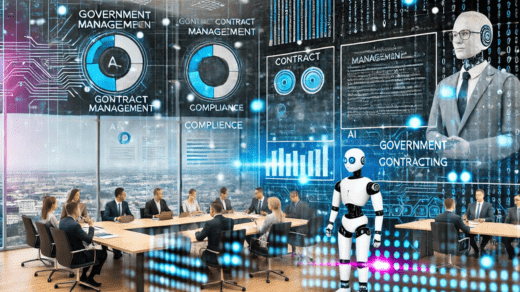GovGPT: Revolutionizing Government Operations with Next-Gen AI

In the rapidly evolving landscape of public sector administration, GovGPT is emerging as a powerful tool that is transforming how governments operate. By integrating next-generation AI, GovGPT offers a host of innovations that streamline operations, enhance decision-making, and improve the delivery of services to citizens. Here’s how GovGPT is revolutionizing government operations:
1. Streamlining Bureaucratic Processes
Traditional government operations often involve cumbersome paperwork, slow decision-making processes, and extensive human intervention. GovGPT is automating and accelerating these workflows by:
- Automated Document Processing: Using natural language processing (NLP), GovGPT can read, analyze, and categorize large volumes of government documents, such as reports, forms, and contracts.
- Smart Workflow Automation: Repetitive administrative tasks like approval workflows, data entry, and report generation are automated, freeing up government employees to focus on more critical tasks.
- Data Integration: GovGPT can pull data from multiple sources, including legacy systems, and synthesize it into actionable insights, improving inter-departmental coordination.
2. Enhancing Public Service Delivery
GovGPT enables governments to provide faster, more efficient services to citizens. By leveraging AI, government agencies can deliver personalized, timely, and efficient public services:
- AI-Powered Citizen Support: GovGPT can be deployed as virtual assistants on government websites and help desks, providing 24/7 support to citizens. It can answer frequently asked questions, assist with filling out forms, and direct citizens to the appropriate departments or resources.
- Faster Benefits Processing: Processing times for public benefits like healthcare, unemployment, and social security can be drastically reduced. GovGPT can assess applications, verify eligibility, and process approvals, speeding up service delivery while reducing errors.
- Personalized Citizen Interaction: By analyzing citizen data, GovGPT can tailor services and responses to individual needs, enhancing the user experience across platforms.
3. Optimizing Procurement and Contract Management
Government procurement processes are often time-consuming and prone to inefficiencies. GovGPT can revolutionize procurement by:
- Automating RFP and Bid Management: GovGPT can analyze Requests for Proposals (RFPs) and automatically generate bid proposals that meet government standards. This reduces delays and enhances the quality of bids.
- Contract Risk Analysis: GovGPT can evaluate government contracts for risk, compliance issues, and potential cost overruns, allowing agencies to make more informed decisions.
- Vendor Matching and Monitoring: GovGPT analyzes vendor performance data and recommends the most qualified contractors, ensuring transparency and value for taxpayers.
4. Improving Policy Development and Analysis
Developing effective policies requires vast amounts of data and comprehensive analysis. GovGPT enhances this process through:
- Policy Simulation and Impact Assessment: GovGPT can simulate the potential outcomes of proposed policies, allowing governments to assess their economic, social, and environmental impacts before implementation.
- Data-Driven Decision Making: GovGPT processes vast datasets, providing insights into trends, public opinion, and economic conditions, allowing policymakers to make more informed decisions.
- Automated Legislative Drafting: AI in government contracting can assist in drafting legal documents, policies, and legislative texts, ensuring they are clear, compliant, and aligned with current laws.
5. Boosting Cybersecurity and Data Protection
As governments increasingly rely on digital SAM.gov, cybersecurity threats become a major concern. GovGPT enhances cybersecurity measures by:
- Threat Detection and Prevention: GovGPT can identify potential vulnerabilities in government IT systems by analyzing network traffic, user behaviors, and system logs. It can detect unusual activity and issue real-time alerts, preventing security breaches.
- Automating Compliance: GovGPT can ensure government agencies remain compliant with evolving data protection regulations by automating security checks, updating protocols, and generating compliance reports.
- Secure Data Sharing: By facilitating encrypted data exchanges between departments and external entities, GovGPT ensures that sensitive information remains protected while improving collaboration.
6. Improving Transparency and Accountability
GovGPT fosters greater transparency in government operations by making information more accessible to the public and enhancing accountability:
- Open Data and Analytics: GovGPT can organize and publish government data in a more digestible format for public consumption. This includes financial reports, policy outcomes, and performance metrics.
- Real-Time Reporting: Government agencies can use GovGPT to generate real-time reports on the status of programs, expenditures, and public service outcomes, promoting greater transparency.
- Citizen Feedback Integration: GovGPT can analyze citizen feedback from various sources—surveys, social media, or service reviews—to provide insights on public sentiment and improve governance.
7. Transforming Workforce Management
GovGPT can also optimize government workforce management by:
- AI-Driven Workforce Planning: Analyze staff data to predict future workforce needs, allowing agencies to allocate resources more efficiently.
- Employee Training and Development: GovGPT can recommend training programs based on an employee’s role, performance, and career goals, fostering professional growth and a more capable workforce.
- Smart Scheduling and Task Management: GovGPT can automate scheduling and task assignment, ensuring that the right personnel are working on the right tasks at the right time.
Conclusion GovGPT is revolutionizing government operations by introducing efficiency, transparency, and innovation through next-gen AI in government contracting. From automating administrative tasks and improving citizen services to enhancing cybersecurity and facilitating policy development, GovGPT is leading the way in modernizing public sector governance. Governments that embrace these AI-driven capabilities will be better equipped to serve their citizens and operate more effectively in a rapidly changing world.
Leave a Reply
You must be logged in to post a comment.




Leave a Comment